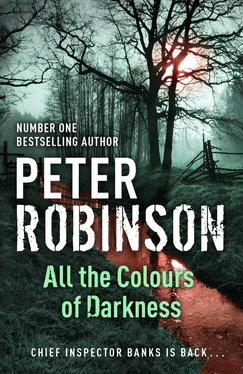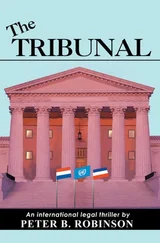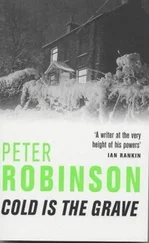Maria Wolsey's flat reminded Annie of where she had lived when she was a student at Exeter. She glimpsed an unmade mattress on the floor in the bedroom, and the bookcases in the living room were made of planks separated by bricks. Posters of Arctic Monkeys and The Killers vied for space with playbills for the RSC and the East-vale Theatre on the walls. The armchairs they sat in needed reupholstering and the mugs they drank their coffee from were chipped and stained.
Maria, it turned out, had only left the University of Bristol, where she had studied drama, a year ago. Eastvale was her first job, and she hoped to use it as a stepping stone to move on to higher and better things. Like Mark Hardcastle, her interest was in theater history, costume design and set production.
“You could say Mark was a sort of mentor to me,” she said, cradling her mug against her chest. The dark-rimmed glasses she had on made her look both older and more of an intellectual. She wore a loose off-the-shoulder top, and her straight brown hair hung over her pale skin. She sat in the chair with her legs crossed, feet bare below the frayed hems of her jeans. In the background, a girl with a wispy voice was singing and playing guitar on the stereo.
“Did the two of you spend much time together?”
“Quite a bit, yes. Usually after work, or on a lunch break, you know. We’d go for a drink or a bite to eat.”
“So you were close? Is that why you rang me?”
Maria’s brow furrowed. She put her mug down on the arm of the chair. “I didn’t want to talk in front of everyone. And Vernon acts like he’s the boss, you know. He’s always putting me down. I think he feels threatened by a competent woman.”
“What about a competent gay man?”
“Come again?”
“Vernon. How did he feel about working for Mark?”
“Oh, that. I see. Vernon’s like a lot of men. He thinks he’s okay with it, but really he’s a homophobe. The whole idea of it terrifies him, threatens his manhood.”
“What’s he doing working in the theater then?”
Maria laughed. “Only job he could get. He’s not a bad carpenter, but there’s not a lot of demand for his skills elsewhere around here.”
“Did he get along all right with Mark?”
Maria twirled a strand of hair as she thought for a moment. “I guess so. I mean, basically Vernon’s a do-as-you’re-told-and-get-on-with-your-work sort of bloke. Salt of the earth, as they say He was just uncomfortable sometimes, that’s all.”
“Did Mark make him feel that way?”
“Not deliberately, just by what he was.”
“Can you give me an example? Did Mark tease him or anything like that?”
“No, nothing like that. It was just... Like, Mark was a great mimic. He could take off just about anyone. You wouldn’t believe how funny he was when he got going. You should have heard his Kenneth Williams, or seen him do his gay John Wayne or his effeminate Barnsley coal miner. Talk about laugh.”
“Did Vernon find this amusing?”
“No. I think it embarrassed him when Mark started doing his outrageously gay routines. I mean, most of the time he was just... you know... ordinary. Well, I don’t mean ordinary, because he was a great bloke, really special, but he didn’t have any affectations or exaggerated mannerisms.”
“I think I understand,” said Annie. “Was Vernon at the theater all Friday afternoon?”
“We all were.”
“During the Calamity Jane matinee?”
“Yes.”
“But could somebody have slipped away?”
“I suppose so. I just don’t believe it, that’s all.”
“Don’t believe what?”
“That Vernon would hurt Mark. I mean, it’s one thing to be a bit uncomfortable around gays, but quite another to go and kill one.”
Annie wasn’t thinking of Mark, but she didn’t need to tell Maria that. “I’m not suggesting he did,” she said. “We have no evidence so far that Mark did anything other than take his own life. I’m just trying to get everything clear, that’s all. What about the morning? Were you all at work then?”
“We didn’t start until noon.”
So Vernon Ross could have killed Laurence Silbert, Annie thought. Maybe it was an unlikely scenario, but it was worth keeping in mind. “What about Derek Wyman?” she asked. “He and Mark went to London together last week.”
“The way I understand it, they really didn’t go together,” said Maria. “Derek told me they were meeting up down there to see some films. He sounded quite excited about it.”
“What did Mark say?”
“I didn’t get to talk to him about it. He was too busy.”
“Did you ever get the feeling that there was anything between Derek Wyman and Mark?”
“Good Lord, no. Derek’s not gay. I can tell you that for sure.”
“How do you know?” Annie asked.
“I can’t really explain it. Gay-dar. No vibe.”
Annie realized that Maria was right. Often a woman could tell. “But they’d never done anything like this before?”
“No. To be honest, it came as quite a surprise to me. I mean, it wasn’t as if they were best of friends or anything.”
“You mean they didn’t get along?”
“No, I’m not saying that. I think Mark just got frustrated with Derek sometimes, that’s all.”
“Why?”
“Because Derek kept trying to do his job, tell him how the production should look and all that. I mean, he is the director, but Mark was a professional. He’d done courses and everything. We were lucky to have him here.”
“I thought they were agreed on the German expressionist set?”
“Well, they were. But it was Derek’s idea, and he wasn’t always receptive when Mark brought fresh perspectives to it. It was as if he expected Mark just to do what he was told, to follow the plans, get the sets built and the costumes made and shut up. But that wasn’t Mark’s way. He was really creative, and he saw a production as more of a collaboration. Between all of us, really. He was always asking our opinions on things. The actors, too. Derek just gave orders. I don’t mean to give the impression that they didn’t like each other or anything. I mean, I know they met socially occasionally, too.”
“Artistic differences, then?”
“Yes. And they’re both from working-class backgrounds, you know, only Mark tried to play down his roots—he even talked a bit posh—while Derek, well, he’s one of those blokes who wears his workingman’s club membership card on his sleeve, even though he’s never been to a workingman’s club in his life, if you know what I mean.”
“I think I do,” said Annie. “Did Mark talk about himself much?”
“Sometimes. Not a lot. He was a great listener, though, was Mark. You could talk to him about anything. When I split up with my boyfriend in February, I must have talked his ear off, but he didn’t complain. And it helped me.”
“You said he’d been a bit strange the past couple of weeks. Do you have any idea why?”
“No. We didn’t really have a chance to get together for a chat or anything during that period, what with one thing and another. Not that he would have told me, anyway.”
“Did he ever tell you if something was bothering him?”
“There were a couple of occasions when he let his guard down.” She put her hand to her mouth to stifle a giggle. “Usually when we’d had a bit too much to drink.”
“And what did he talk about on these occasions?”
“Oh, you know. Life. His feelings. His ambitions.”
“Can you tell me more?”
“Well, you know about his background, don’t you? Barnsley and all that?”
“A bit.”
“It was something he was very uncomfortable about. He was an only child, you see, and he didn’t turn out to be exactly the sort of son his father wanted. His father was a miner and very macho, apparently, played rugby and all that. Mark wasn’t very good at sports. Worse, he wasn’t even interested. He did well at school, though.”
Читать дальше












